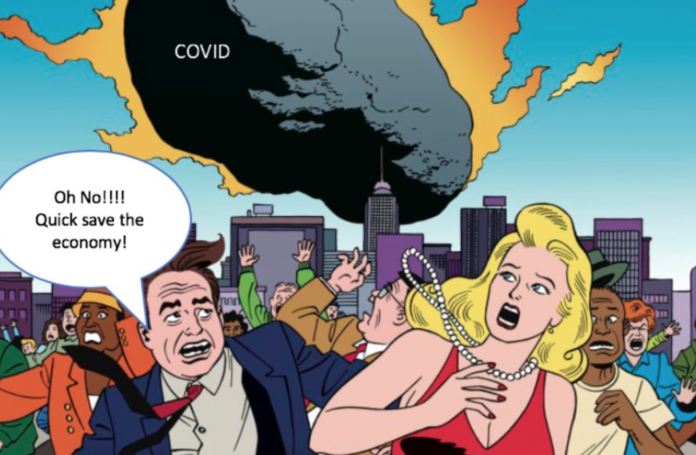It has been interesting to see the increasing fractiousness in the USA and UK over the question of when to re-open the economy. The UK has just had one of its worst days for new cases and the death numbers are now 20,000, expected to treble. Huge numbers of health workers are getting the virus. And none of this even counts the number of deaths in rest homes or other places (only in hospitals). And yet there is huge pressure to urgently open the economy up to …. ummm… huge further infection?
Not surprisingly, the USA has dealt with the crisis much as it deals with everything nowadays – with confusion and an acrimonious spirit. It is not only the Dear Leader’s ramblings. Trumpism is obviously a virus that has attacked the whole of the nation, and, in particular, Republican leaders.
There is no doubt that the ‘freedom’ called for by those wanting to open the economy will also be a freedom to die of the virus. There is still nothing, except our own resolve, to stop the numbers I discussed a few weeks ago, whereby millions die, from coming to pass. The danger is so far from over that I despair of the political games being played across these countries and others.
I see that 200,000 have now died (of those recorded) and what we have learned, with death rates of 5% to 15%, is that it would only take a re-opening in populous countries to see that rate rise by a factor of one or two more zeros.
Here I might quote Thomas Hobbes, who was the first to set out the theory of legitimate government and the social contract. He argued that we cede freedoms to government in order that good things can happen in the public interest. In the state of nature, he says, without such government, all of our collective endeavours are eradicated:
In such condition, there is no place for industry; because the fruit thereof is uncertain: and consequently no culture of the earth; no navigation, nor use of the commodities that may be imported by sea; no commodious building; no instruments of moving, and removing, such things as require much force; no knowledge of the face of the earth; no account of time; no arts; no letters; no society; and which is worst of all, continual fear, and danger of violent death; and the life of man, solitary, poor, nasty, brutish, and short.
I would not consider myself much of a fan of Hobbes, but it is undeniable that an overt social contract has been to the fore in the virus. In New Zealand, this has been achieved by an unprecedented level of social support. People (everyone except the idiots) have actively chosen to support the strategy so clearly laid out by this government, because they can see the public interest in it.
And it is also possible to see in Hobbes what happens if this breaks down, either because of the ‘freedom’ rallies in States throughout the US, or because governments and leaders fail to do the work that the social contract requires, and open up economies too early.
In that case, we can add to Hobbes’ equation, in addition to lives being poor, nasty, brutish and short, people will die alone in the corridors of overwhelmed hospitals (or at home) having lost the painful struggle to breathe, and world deaths will pile up in their millions.
The fact of our success to date in Aotearoa belies that this is a very serious business. The pandemic will one day pass, as will the economic losses, but at what cost? History will judge harshly those leaders that, despite all warnings, throw open the doors of infection/economy too early.
Dr Liz Gordon is a researcher and a barrister, with interests in destroying neo-liberalism in all its forms and moving towards a socially just society. She usually blogs on justice, social welfare and education topics.



Comments are closed.